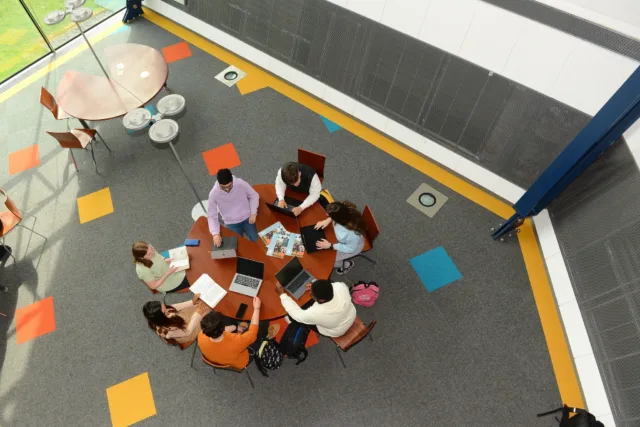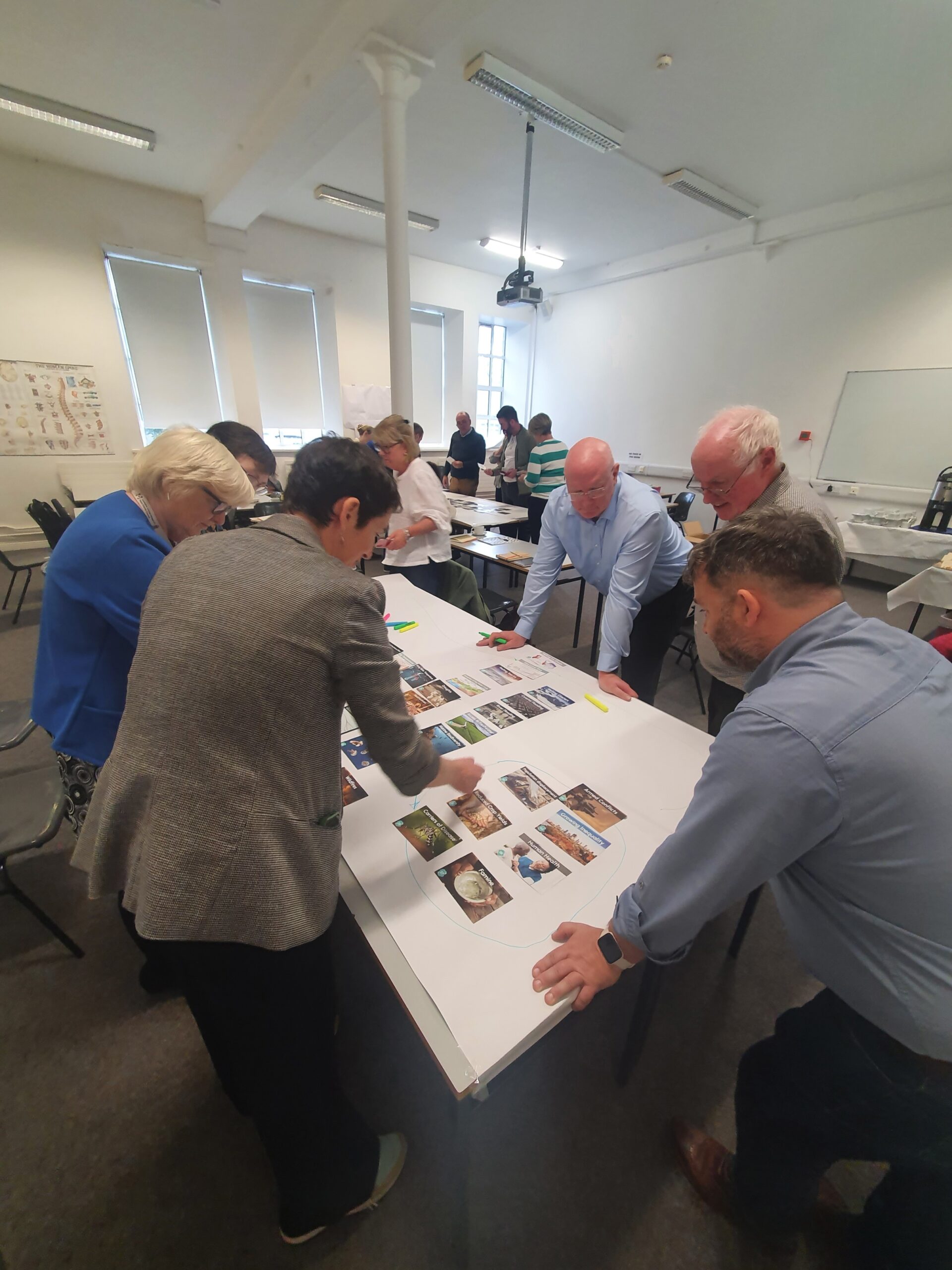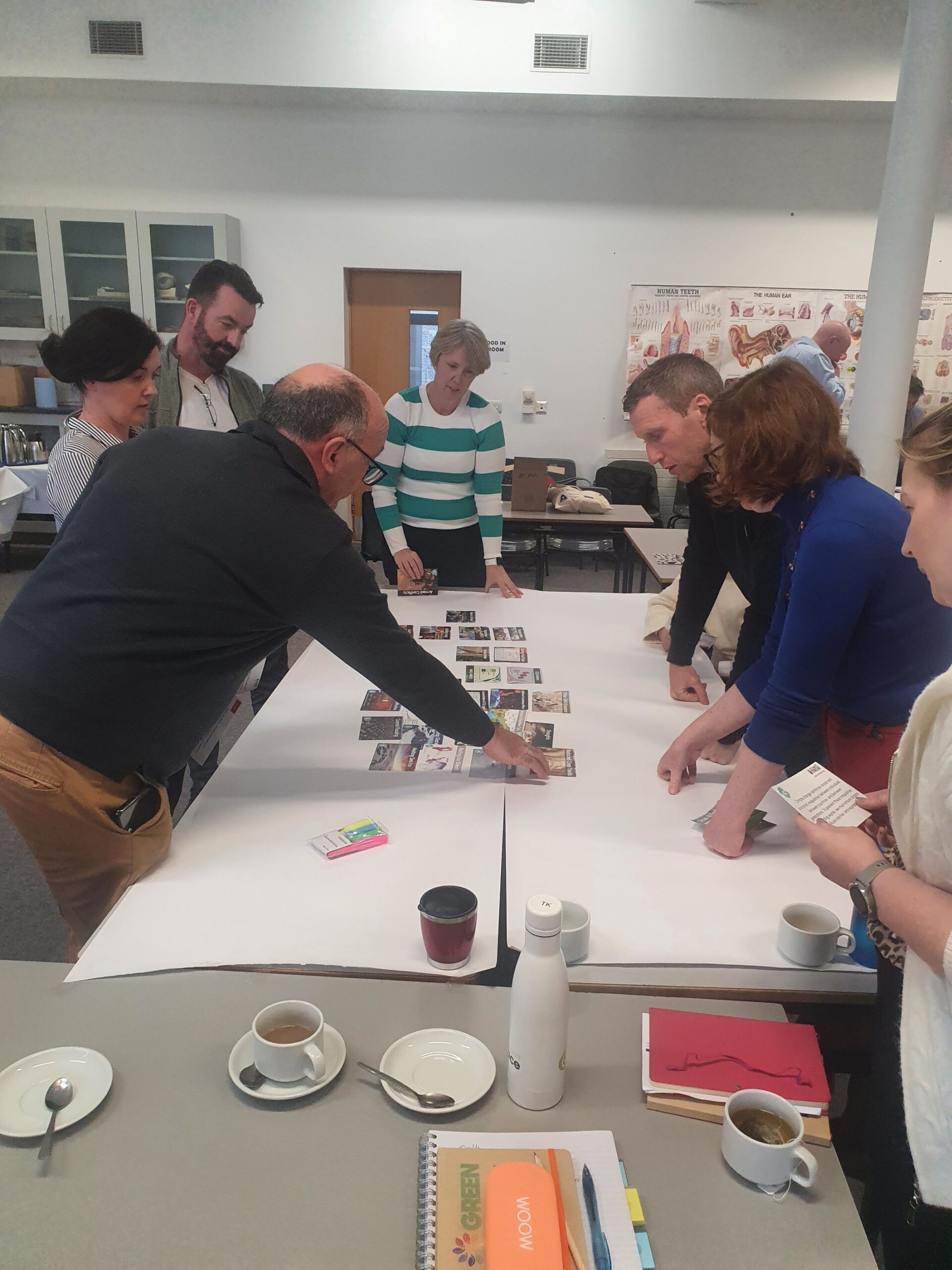Sustainability Leadership
Postgraduate Certificate
Sonraí an Chúrsa
| Course Code | GA_SUSLC_N09 |
|---|---|
| Céim | 9 |
| Fad ama | 1 semester |
| Creidmheasanna | 30 |
| Modh Seachadta | Blended |
| Suímh campais | Mayo |
| Modh Seachadta | Páirtaimseartha |

Forbhreathnú Cúrsa
The overall aim of the programme is to provide a critical awareness of the complex social, economic, and environmental challenges and to develop strategic, critical and systems thinking competencies to embed sustainability and into organisational practices and decisions. The programme will focus on the knowledge, skills, and competencies specific to sustainability leadership and facilitate integration with the professional context of the individual student.
A key theme in the programme is developing a mindset for leading transformative change. The programme includes Sustainability Mindset Indicator (SMI) profiling. The Sustainability Mindset Indicator (SMI) is an instrument to map and profile where an individual is on their journey towards a Sustainability Mindset. It provides participants with personalized reports that highlight their unique skills and opportunities to lead change. (https://smindicator.com)
This is a part-time programme, designed for those with busy working and personal lives! There is a blended approach to teaching and learning, whereby students will attend classroom-based learning (residential workshops) in monthly blocks throughout the semester and prepare for these sessions in the intervening period with designated on-line materials on the ATU Virtual Learning platform (Moodle).
The monthly dates are:
| Workshop 1 | Thursday 29th January 2026, 2-6pm Friday 30th January 2026, 9am-6pm |
| Workshop 2 | Thursday 26th February, 2-6pm Friday 27th February, 9am-6pm |
| Workshop 3 | Thursday 26th March 2026, 2-6pm |
| Workshop 4 | Thursday 23rd April 2026, 2-6pm Friday 24th April 2026, 9am-6pm |
Classes/workshops are provided at ATU Mayo, Castlebar (unless otherwise specified) and accommodation is included in the fee and provided locally for the four residential blocks. This programme structure and residential delivery model successfully runs in other postgraduate programmes at ATU Mayo. The residential element is not obligatory, but students find this an effective space for networking, peer learning and focus time.
Students who complete the Postgraduate Certificate in Sustainability Leadership may wish to progress to the Postgraduate Diploma in Sustainability Leadership and ultimately to the MSc in Sustainability Leadership.
Sonraí an Chúrsa
Bliain 1
| Seimeastar | Sonraí an Mhodúil | Creidmheasanna | Éigeantach / Roghnach |
|---|---|---|---|
| 1 |
Understanding the Sustainability ChallengeIn the context of unfolding climate breakdown, with the socio-political implications of this becoming more apparent, this module sets out to examine the concept of 'sustainability'. Although the concept is a central value in the United Nations sustainable development goals and in many countries' policy frameworks, the claim underlying the concept has been subject to critical analysis for some time. The module addresses a number of questions. Is sustainability, as currently envisaged, compatible with economic growth and development? Is any growth justifiable given the contemporary climate and habitat crises, with their attendant human displacement issues? Is it possible to reconcile ecological concerns with social justice or principles of equality? Is the only truly sustainable position a measured human withdrawal from the natural world in favour of 're-wilding' or regeneration? How truly sustainable is 'sustainable development' if it is predicated on further extraction of resources and the expansion of a growth-led consumer economy, however modest this may purport to be? The 'Green economy' itself requires vast resources to be implemented. The module seeks to involve students in thinking their way through these and other critical questions. Torthaí Foghlama 1. Critically articulate the ecological, economic and social challenges of the 21st century 2. Demonstrate an ability to critically applythe sustainability concept, particularly encompassingits historical origins and contemporary expressions 3. Analyse the critiques of sustainability with particular reference to anti-colonial, gender, and indigenous perspectives, socio-ecological frameworks, and contemporary political theory. 4. Engage with imagining responses to the ecological and social crises of the 21st century grounded on contemporary theory in the social and physical sciences. |
10 | Mandatory |
| 1 |
Assessing the ImpactThe basis of sustainability from a business perspective is reported as the triple bottom line, in the hope of addressing the three Es / Ps. However, when one critically examines this model each of the Es, in most business contexts component has an equal waiting which fails to realise the nested nature and complexity of the systems. Within this module students will be introduced to the wide range of impacts that current economic and development strategies are having on the environment, society and the economy. The module initially focuses on understanding the impacts of existing business models in a holistic way – from the social, economic and environmental perspectives. Initially the module seeks to create a critical awareness of these impacts and of existing metrics and reporting in the business community and in wider society. There is a critique of the value, usefulness and role of the exiting metrics. Based this critique, students are challenged to scope and explore the impacts of business on the broader ecosystem and the opportunities for developing new metrics and explore other ways of reporting that acknowledge the primacy of environment and society over economy. This re-imaging exercises will require innovation and explore emerging practices in addition to encouraging creativity of students in addressing means of adapting and developing metrics that are a true measure of the triple bottom line. Torthaí Foghlama 1. Assess an organisations environmental impact in terms of existing energy usage, CO2 emissions, water usage, resource requirements and efficiency, waste generation andmanagement (includingopportunities for engaging circular economy principles) and biodiversity. 2. Identify and evaluate the broader range of ecosystem impacts that an organisation / operation has 3. Be familiar with national and international environmental legislation,policies and targets for a specific sector 4. Critically evaluate existing climate change, sustainabilitymetrics and reporting protocols and be innovative in proposing other potential metrics. 5. Analyse organisational impact metrics and prepare a report which includes a strategic mitigation plan |
10 | Mandatory |
| 1 |
Sustainability Leadership and ChangeThis module examines the role, importance and impact of effective leadership in the transformation required to integrate sustainability into organisations. Students will gain an insight into their own leadership style and will critically evaluate the potential of successful leadership to inspire, motivate and manage others, to address systems and norms in driving a sustainability vision and deliver on organisational goals. There will be a focus on the role of values at individual and organisation level, the complexity of the interconnected nature of social, environmental and economic challenges and sensitivity to context. Torthaí Foghlama 1. Critically appraise theories of leadership and the principles of sustainability leadership. 2. Demonstrate a critical awareness of the process of change and the skills needed to lead and manage others insustainability change. 3. Apply leadership and collaborative skills to the engagement of internal and external stakeholders on sustainability initiativies. 4. Critically analyse the role of leadership in creating and communicating sustainability vision, instilling a culture of trust and integrating with organisational goals. 5. Engage inongoing critical reflection on the effectiveness of his/herown leadership. |
10 | Mandatory |
Scrúdú agus Measúnú
Note: Where assessment on the programme involves examinations, these are held on campus or at another exam venue in the Republic of Ireland. There are typically two exam periods: January and May. Times scheduled for examinations (face to face / online exams ) are in GMT.
Riachtanas Tinrimh ar an gCampas
Note: Check programme Examination and Assessment requirements, as they may involve examinations to be taken on campus.
Download a prospectus
Riachtanais Iontrála
Applicants must hold a level 8 Bachelor (Hons) degree with a minimum grade classification of H2.2 or equivalent. Given the cross disciplinary nature of the programme, applicants may be from a range of disciplines. It is expected that applicants will have experience in an organisational environment and will be in a position to lead a sustainability related change.
Further Information
Application Closing Date
Start Date
Eolas Teagmhála
Dr Deirdre Garvey
E:deirdre.garvey@atu.ie
Programme Chair
SMI Educator and member of the PRME Working Group on the Sustainability Mindset
Media
The Mayo Rising event in June 2025 was a collaborative initiative created by the students of the Sustainability Leadership programme. Find out more about the experience of the students on the programme in our video below:


Image description: Sustainability Leadership class groups completing a Climate FRESK
Environmental Humanities & Social Sciences

